一般现在时、一般过去时、现在进行时、现在完成时、过去完成时、过去将来时、一般将来时初中全部时态练习题
初中 高中 英语十六种时态详解

英语时态分为16种:一般现在时,一般过去时,一般将来时,一般过去将来时;现在进行时,过去进行时,将来进行时,过去将来进行时;现在完成时,过去完成时,将来完成时,过去将来完成时;现在完成进行时,过去完成进行时,将来完成进行时,过去将来完成进行时.英语时态的用法:一、一般现在时的用法1.表示现在习惯或经常反复发生的动作。
常与always, usually, often, sometimes, every day (week, month)等连用。
He plays football twice a week.他每周踢两次足球。
I sometimes go to work on foot.我有时步行去上班。
2.表示现在的事实或状态。
It’s cold today.今天很冷。
You look tired now.你现在看起来很疲乏。
3.表示主语所具有的特征,性格和能力等。
She is a famous singer.她是个著名的歌唱家。
Tom likes swimming.汤姆喜欢游泳。
4.表示客观事实或普遍其理。
It’s far from the eart h to the sun.地球与太阳间的距离很远。
Five and three makes eight.五加三得八。
5.表示已预先安排或计划好将来确定会发生的动作。
(仅限于某些表示“来、去、动、停、开始、结束、继续”等的动词)可以与表示未来时间的状语搭配使。
常见的用法是:飞机、火车、轮船、汽车等定期定点运行的交通方式。
主要用于go, come, leave, start, return, arrive等瞬间动词。
例:The next train leaves at 3 o'clock this afternoon(下一趟火车今天下午3点开车。
)How often does this shuttle bus run? (这班车多久一趟?)The train from London arrives at 7:00.从伦敦来的火车7:00到站。
初中英语时态8种基本时态讲解
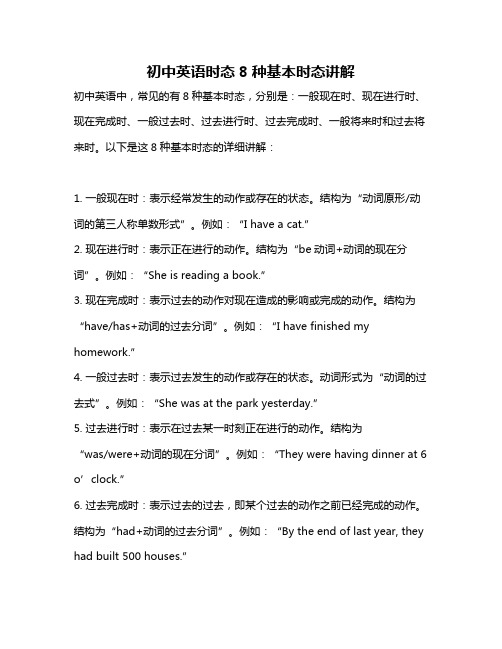
初中英语时态8种基本时态讲解初中英语中,常见的有8种基本时态,分别是:一般现在时、现在进行时、现在完成时、一般过去时、过去进行时、过去完成时、一般将来时和过去将来时。
以下是这8种基本时态的详细讲解:1. 一般现在时:表示经常发生的动作或存在的状态。
结构为“动词原形/动词的第三人称单数形式”。
例如:“I have a cat.”2. 现在进行时:表示正在进行的动作。
结构为“be动词+动词的现在分词”。
例如:“She is reading a book.”3. 现在完成时:表示过去的动作对现在造成的影响或完成的动作。
结构为“have/has+动词的过去分词”。
例如:“I have finished my homework.”4. 一般过去时:表示过去发生的动作或存在的状态。
动词形式为“动词的过去式”。
例如:“She was at the park yesterday.”5. 过去进行时:表示在过去某一时刻正在进行的动作。
结构为“was/were+动词的现在分词”。
例如:“They were having dinner at 6 o’clock.”6. 过去完成时:表示过去的过去,即某个过去的动作之前已经完成的动作。
结构为“had+动词的过去分词”。
例如:“By the end of last year, they had built 500 houses.”7. 一般将来时:表示将来要发生的动作或存在的状态。
结构为“will+动词原形”或“am/is/are going to+动词原形”。
例如:“We will visit the museum next week.”8. 过去将来时:表示从过去的某一时刻看,将来要发生的动作或存在的状态。
结构为“would+动词原形”或“was/were going to+动词原形”。
例如:“He said he would come back soon.”以上就是初中英语8种基本时态的讲解,希望对你有帮助!。
简单的时态一般现在时一般过去时将来时现在进行时和过去进行时
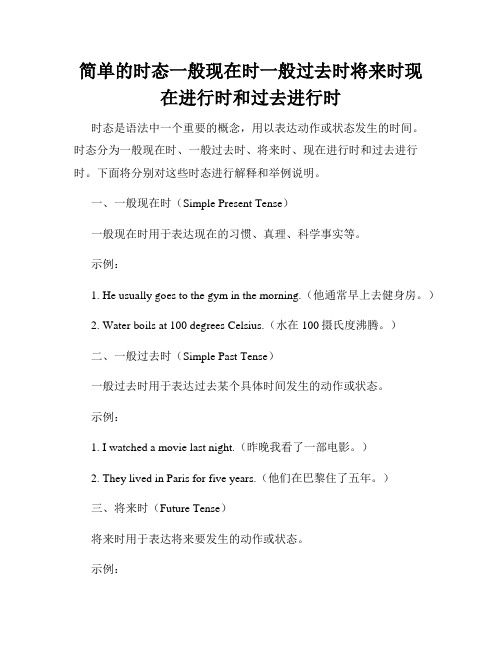
简单的时态一般现在时一般过去时将来时现在进行时和过去进行时时态是语法中一个重要的概念,用以表达动作或状态发生的时间。
时态分为一般现在时、一般过去时、将来时、现在进行时和过去进行时。
下面将分别对这些时态进行解释和举例说明。
一、一般现在时(Simple Present Tense)一般现在时用于表达现在的习惯、真理、科学事实等。
示例:1. He usually goes to the gym in the morning.(他通常早上去健身房。
)2. Water boils at 100 degrees Celsius.(水在100摄氏度沸腾。
)二、一般过去时(Simple Past Tense)一般过去时用于表达过去某个具体时间发生的动作或状态。
示例:1. I watched a movie last night.(昨晚我看了一部电影。
)2. They lived in Paris for five years.(他们在巴黎住了五年。
)三、将来时(Future Tense)将来时用于表达将来要发生的动作或状态。
示例:1. We will have a meeting tomorrow.(我们明天要开会。
)2. She is going to travel to Japan next month.(她下个月将要去日本旅行。
)四、现在进行时(Present Continuous Tense)现在进行时用于表达正在进行的动作。
示例:1. They are watching TV at the moment.(他们此刻正在看电视。
)2. She is studying for her exam right now.(她正在复习考试。
)五、过去进行时(Past Continuous Tense)过去进行时用于表达过去某一时刻正在进行的动作。
示例:1. I was reading a book when she called.(她给我打电话的时候,我正在看书。
初中英语八大时态知识点详解 4
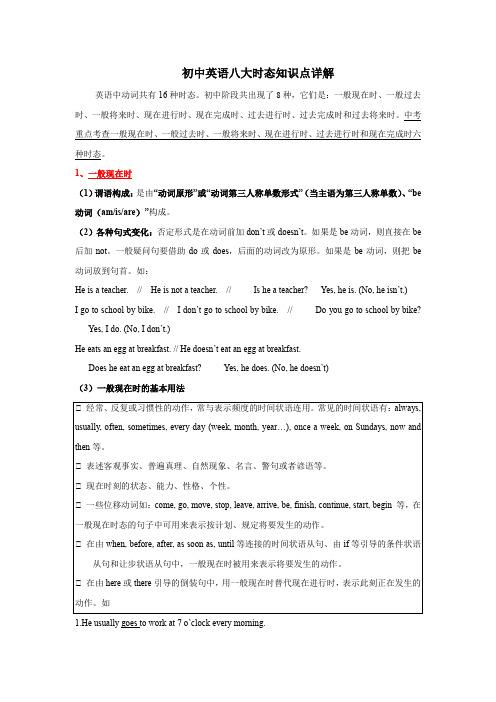
初中英语八大时态知识点详解英语中动词共有16种时态。
初中阶段共出现了8种,它们是:一般现在时、一般过去时、一般将来时、现在进行时、现在完成时、过去进行时、过去完成时和过去将来时。
中考重点考查一般现在时、一般过去时、一般将来时、现在进行时、过去进行时和现在完成时六种时态。
1、一般现在时(1)谓语构成:是由“动词原形”或“动词第三人称单数形式”(当主语为第三人称单数)、“be 动词(am/is/are)”构成。
(2)各种句式变化:否定形式是在动词前加don’t或doesn’t。
如果是be动词,则直接在be 后加not。
一般疑问句要借助do或does,后面的动词改为原形。
如果是be动词,则把be 动词放到句首。
如:He is a teacher. // He is not a teacher. // ---- Is he a teacher? --- Yes, he is. (No, he isn’t.)I go to school by bike. // I don’t go to school by bike. // ---- Do you go to school by bike? ---- Yes, I do. (No, I don’t.)He eats an egg at breakfast. // He doesn’t eat an egg at breakfast.---- Does he eat an egg at breakfast? ---- Yes, he does. (No, he doesn’t)(3)一般现在时的基本用法1.He usually goes to work at 7 o’clock every morning.2.Every dog has its day. 凡人皆有得意日。
3.Pride goes before a fall. 骄者必败。
4.The earth goes around the sun. 地球绕着太阳转。
初中常见8种时态

初中常见8种时态.初中常用的有8种时态:一般现在时,一般过去时,一般将来时,现在进行时,过去进行时,现在完成时,过去完成时和过去将来时,其他时态在初中少见。
一、一般现在时;通常以动词原形表示。
主语是第三人称单数时,其变化按照动词的基本形式中第三人称单数变化规则用法;1.现在时刻发生的动作或存在的状态。
eg;What time is it now?现在几点了?2.主句的特征、性格或能力.eg;Dose Miss White teaches French?XXX小姐是教法语的吗?3.客观真理和客观存在及自然现象。
eg;The sun rises in the east.太阳从东方升起。
4.常性的动作,常与always。
usually。
often。
sometimes。
seldom。
once a week。
every day等时间状语连用。
eg;They often play football.他们常常踢足球。
5.用于时间、条件、方式、让步状语从句中表示将要发生的动作。
eg;I’ll tell him about the news when he comes.他来时我会告诉他信息。
6.表示按时间表拟定的或已经安排好的事情,或要发生的动作。
主要用于come,return,leave,sail,arrive等瞬间动词,句中常有表示将来时间的状语。
eg;XXX.他今晚回来。
7、表示最近的将来,说话人说话时动作尚未开始,但即将开始。
.eg;Now I go.现在我走啦。
二、一般过去时;一般过去时是表示过去经常或偶然发生的动作或存在的状态的时态.用法;1、表示过去发生、完成的事或存在的状态,与表示过去时间的状语yesterday,lastweek,hours age。
just now。
in 1990等连用。
eg;What time is it now?现在几点了?2.主句的特征、性格或能力.eg;Dose Miss White teaches French?XXX小姐是教法语的吗?3.表示过去经常或反复发生的动作,常与always。
句子时态

一般现在时、一般过去时、一般将来时、现在进行时、过去进行时、现在完成时、过去完成时,过去将来时,现在完成进行时。
常用的时态只有八种。
1.一般现在时的用法1)表示经常性、习惯性的动作;表示现在的状态、特征和真理.句中常用often,usually,every day等时间状语。
例如:He goes to school every day.(经常性动作) He is very happy.(现在的状态)The earth moves around the sun.(真理)2)在时间状语从句和条件状语从句中,用一般现在时表示将来.例如:If you come this afternoon,we' ll have a meeting.When I graduate,I’ll go to the countr yside.3)有时这个时态表示按计划、规定要发生的动作,(句中都带有时间状语)但限于少数动词如begin,come,leave,go,arrive,start,stop,return,open,close等.例如:The meeting begins at seven. The train starts at nine in the morning.4)表示状态和感觉的动词,如be,like,hate,think,remember,find,sound等常用一般现在时.例如:I like English very much. The story sounds very interesting.5)书报的标题,小说等情节介绍常用一般现在时.2.一般过去时的用法l)表示过去某时间发生的事、存在的状态或过去反复发生的动作.He saw Mr Wang yesterday. He worked in a factory in 19862)表示过去经常发生的动作,也可用―used to‖和―would +动词原形‖。
一般现在时,一般过去时,一般将来时及现在进行时
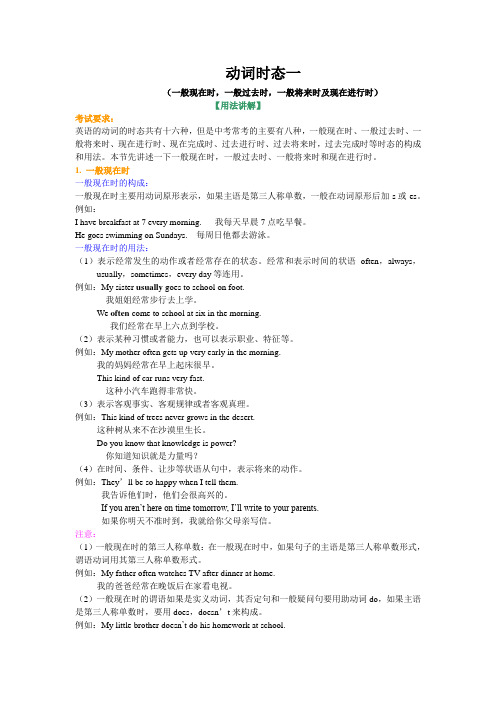
动词时态一(一般现在时,一般过去时,一般将来时及现在进行时)【用法讲解】考试要求:英语的动词的时态共有十六种,但是中考常考的主要有八种,一般现在时、一般过去时、一般将来时、现在进行时、现在完成时、过去进行时、过去将来时,过去完成时等时态的构成和用法。
本节先讲述一下一般现在时,一般过去时、一般将来时和现在进行时。
1. 一般现在时一般现在时的构成:一般现在时主要用动词原形表示,如果主语是第三人称单数,一般在动词原形后加-s或-es。
例如:I have breakfast at 7 every morning. 我每天早晨7点吃早餐。
He goes swimming on Sundays. 每周日他都去游泳。
一般现在时的用法:(1)表示经常发生的动作或者经常存在的状态。
经常和表示时间的状语often,always,usually,sometimes,every day等连用。
例如:My sister usually goes to school on foot.我姐姐经常步行去上学。
We often come to school at six in the morning.我们经常在早上六点到学校。
(2)表示某种习惯或者能力,也可以表示职业、特征等。
例如:My mother often gets up very early in the morning.我的妈妈经常在早上起床很早。
This kind of car runs very fast.这种小汽车跑得非常快。
(3)表示客观事实、客观规律或者客观真理。
例如:This kind of trees never grows in the desert.这种树从来不在沙漠里生长。
Do you know that knowledge is power?你知道知识就是力量吗?(4)在时间、条件、让步等状语从句中,表示将来的动作。
例如:They’ll be so happy when I tell them.我告诉他们时,他们会很高兴的。
八种英语时态基本句型
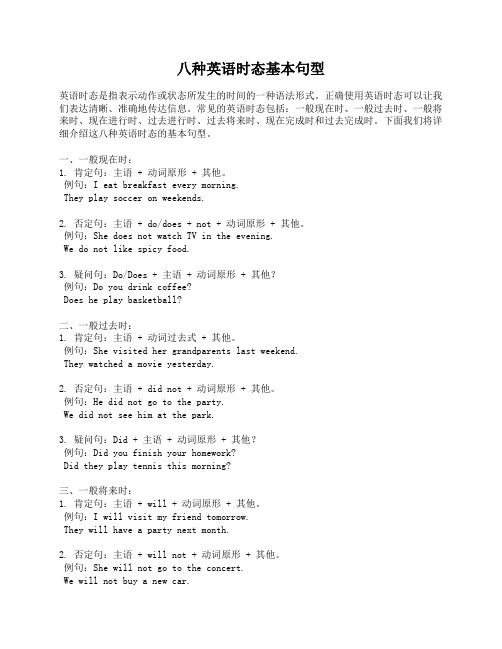
八种英语时态基本句型英语时态是指表示动作或状态所发生的时间的一种语法形式。
正确使用英语时态可以让我们表达清晰、准确地传达信息。
常见的英语时态包括:一般现在时、一般过去时、一般将来时、现在进行时、过去进行时、过去将来时、现在完成时和过去完成时。
下面我们将详细介绍这八种英语时态的基本句型。
一、一般现在时:1. 肯定句:主语 + 动词原形 + 其他。
例句:I eat breakfast every morning.They play soccer on weekends.2. 否定句:主语 + do/does + not + 动词原形 + 其他。
例句:She does not watch TV in the evening.We do not like spicy food.3. 疑问句:Do/Does + 主语 + 动词原形 + 其他?例句:Do you drink coffee?Does he play basketball?二、一般过去时:1. 肯定句:主语 + 动词过去式 + 其他。
例句:She visited her grandparents last weekend.They watched a movie yesterday.2. 否定句:主语 + did not + 动词原形 + 其他。
例句:He did not go to the party.We did not see him at the park.3. 疑问句:Did + 主语 + 动词原形 + 其他?例句:Did you finish your homework?Did they play tennis this morning?三、一般将来时:1. 肯定句:主语 + will + 动词原形 + 其他。
例句:I will visit my friend tomorrow.They will have a party next month.2. 否定句:主语 + will not + 动词原形 + 其他。
(完整版)英语常用的八种时态

英语时态初中阶段应掌握的时态共有八种,即一般现在时,一般将来时,一般过去时,现在进行时,过去进行时,过去将来时,现在完成时,过去完成时。
现从结构,作用,时间状语三方面加以介绍。
●动词形式分五种:1.动词原形→ 2.第三人称单数→ 3.过去式→ 4.过去分词→ 5.现在分词一、一般现在时其结构为:be动词肯定句主语+am,is,are+其它。
否定句主语+am,is,are + not+其它。
一般疑问句 Am,Is,Are+主语+其它?特殊疑问句特殊疑问词+am,is,are+主语+其它?实意动词1)主语为第一,二人称及第三人称复数时肯定句主语+动词原形+其它。
否定句主语+don't+动词原形+其它。
一般疑问句 Do +主语+动词原形+其它?特殊疑问句特殊疑问词+do+主语+动词原形+其它?2)主语为第三人称单数时肯定句主语+动词第三人称单数 +其它。
否定句主语+doesn't+动词原形+其它。
一般疑问句 Does+主语+动词原形+其它?特殊疑问句特殊疑问词+does+主语+动词原形+其它?其作用为:表示习惯性,经常性的动作;表示现在的状态与特征;表示普遍真理其常用时间状语为often,always,usually,sometimes,everyday(week,year...), in the morning(afternoon,evening)等。
Ex . 1. _______ she _______ (go)to the library every Sunday?此题为习惯性动作,答案为Does,go.2.They often _______(swim)in summer.此题为经常性动作,答案为swim.3.______(be)everyone here?此题表示现在的状态,答案为Is.4.The earth______(travel) round the sun.此题表示普遍真理,答案为travels.二、一般过去时其结构为:be动词肯定句主语+was,were+其它。
英语时态总共有16种

英语时态总共有16种,但是常见的9种,常用8种时态是谓语动词所表示的动作或情况发生时间的各种形式.英语动词有16种时态,但是常见的只有九种:一般现在时、一般过去时、一般将来时、现在进行时、过去进行时、现在完成时、过去完成时,过去将来时,现在完成进行时。
常用的时态只有八种。
一:一般现在时的用法1..概念:经常、反复发生的动作或行为及现在的某种状况1)表示经常性、习惯性的动作;表示现在的状态、特征和真理.句中常用always, usually, often, sometimes, every we ek (day, year, month…), once a week, on Sundays等时间状语。
例如:He goes to school every day.(经常性动作)He is very happy.(现在的状态)The earth moves around the sun.(真理)2)在时间状语从句和条件状语从句中,用一般现在时表示将来.例如:If you come this afternoon,we' ll have a meeting.When I graduate,I’ll go to the countryside.3)有时这个时态表示按计划、规定要发生的动作,(句中都带有时间状语)但限于少数动词如begin,come,leave,go,arrive,start,stop,return,open,close等.例如:The meeting begins at seven.The train starts at nine in the morning.4)表示状态和感觉的动词,如be,like,hate,think,remember,find,sound等常用一般现在时.例如:I like English very much.The story sounds very interesting.5)书报的标题,小说等情节介绍常用一般现在时.2.基本结构:动词原形(如主语为第三人称单数,动词上要加(e)S)。
英语语中常见的时态有8种

语中常见的时态有8种--- 一般现在时/一般过去时;现在进行时/过去进行时;一般将来时/过去将来时;现在完成时/过去完成时。
另外还有现在完成进行时/过去完成进行时,将来完成时,将来进行时。
一关于一般现在时(第三人称动词后加” s” 或“es” )(1)表示经常性、习惯性动作。
(2)普遍真理、自然现象,谚语、报刊标题等(3)代替将来时(主从句均为将来时时,代替从句中的将来时)(4)以here ,there 开头的句子中,动词go come 等用现在时代替进行时Here comes the bus. There goes the bell.二关于一般过去时(谓语构成: V +ed, 注意不规则动词的构成)(1)表过去经常性、习惯性动。
(注意比较would do/ used to do )She often came to visit us when she was there.Whenever I went to Beijing, he would come to guide me.(2) 过去某一时刻发生的动作。
三关于现在进行时(am/is/are + ving)(1) 表示此时此刻或现阶段正在进行的动作。
How are getting along with your studies these days?More and more people are giving up smoking.(2) 表将来,用于从句中,可代替将来时。
常用于瞬间动词,如come, go, leave, arrive, die 等,常表示渐进或安排要进行的动作。
If she is doing her homew ork, don’t interrupt her.He is dying.注意:系动词look, feel, taste, smell, sound, prove,等及心理活动的动词want, mean, mind, hope, understand, know, like, dislike ,love, prefer, hate ,doubt等一般不用进行时。
初中英语时态8种基本时态
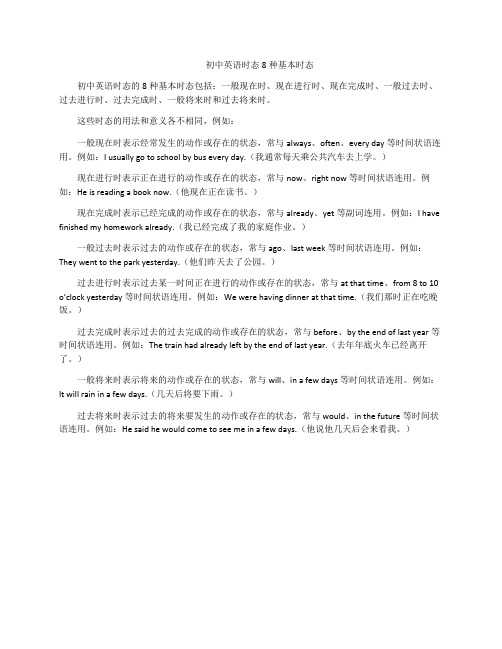
初中英语时态8种基本时态初中英语时态的8种基本时态包括:一般现在时、现在进行时、现在完成时、一般过去时、过去进行时、过去完成时、一般将来时和过去将来时。
这些时态的用法和意义各不相同,例如:一般现在时表示经常发生的动作或存在的状态,常与always、often、every day等时间状语连用。
例如:I usually go to school by bus every day.(我通常每天乘公共汽车去上学。
)现在进行时表示正在进行的动作或存在的状态,常与now、right now等时间状语连用。
例如:He is reading a book now.(他现在正在读书。
)现在完成时表示已经完成的动作或存在的状态,常与already、yet等副词连用。
例如:I have finished my homework already.(我已经完成了我的家庭作业。
)一般过去时表示过去的动作或存在的状态,常与ago、last week等时间状语连用。
例如:They went to the park yesterday.(他们昨天去了公园。
)过去进行时表示过去某一时间正在进行的动作或存在的状态,常与at that time、from 8 to 10 o’clock yesterday等时间状语连用。
例如:We were having dinner at that time.(我们那时正在吃晚饭。
)过去完成时表示过去的过去完成的动作或存在的状态,常与before、by the end of last year等时间状语连用。
例如:The train had already left by the end of last year.(去年年底火车已经离开了。
)一般将来时表示将来的动作或存在的状态,常与will、in a few days等时间状语连用。
例如:It will rain in a few days.(几天后将要下雨。
高中英语知识点总结:十六种时态

高中英语知识点总结:十六种时态导读:本文高中英语知识点总结:十六种时态,仅供参考,如果能帮助到您,欢迎点评和分享。
十六种时态:一般现在时,一般过去时,一般将来时,一般过去将来时;现在进行时,过去进行时,将来进行时,过去将来进行时;现在完成时,过去完成时,将来完成时,过去将来完成时;现在完成进行时,过去完成进行时,将来完成进行时,过去将来完成进行时.一、一般现在时:take形式为原形例子:It take sme five years to finish the painting。
这幅画花了我十年功夫1.概念:经常、反复发生的动作或行为及现在的某种状况。
2.时间状语:always,usually,often,sometimes,everyweek(day,year,month…), once a week,on Sundays,3.基本结构:动词原形(如主语为第三人称单数,动词上要改为第三人称单数形式)二、一般过去时:take形式为took.1.概念:过去某个时间里发生的动作或状态;过去习惯性、经常性的动作、行为。
2.时间状语:ago,yesterday,the day before yesterday,lastweek,last(year,night,month…),in1989,just now,at the age of 5,one day,long long ago,once up on a time,etc.3.基本结构:be动词;行为动词的过去式三、现在进行时:take形式为am/is/are taking1.概念:表示现阶段或说话时正在进行的动作及行为。
2.时间状语:now,at this time,these days,etc.3.基本结构:am/is/are+doing四、过去进行时:take形式为was/were+taking1.概念:表示过去某段时间或某一时刻正在发生或进行的行为或动作。
初中常用的有8种时态

初中常用的有8种时态:一般现在时,一般过去时,一般将来时,现在进行时,过去进行时,现在完成时,过去完成时和过去将来时,其他时态在初中少见(一)一般现在时的定义:一般现在时是表示现在经常反复发生的动作存在的状态或习惯性的动作的时态.一般现在时的构成:(这是一个简单的表格)动词肯定句否定句Iam...Iamnot...beYou/We/TheyareYou/We/TheyarenotHe/She/ItisHe/She/Itisnot一般现在时用行为动词的原形,主语是he,she,it这些第三人称单数时,动词要加s 或es.(二)一般过去时的定义:一般过去时是表示过去经常或偶然发生的动作或存在的状态的时态.一般过去时的构成:动词肯定句否定句Iwas...Iwasnot...beHe/She/Itwas...He/She/Itwasnot...We/You/Theywere...We/You/Theywerenot...一般过去时用动词的过去式动词的过去式一般都加ed,如workworked.结尾是e的只加d,如likeliked.末尾只有一个辅音字母的重读闭音节要双写这个字母再加ed,如stops topped,以辅音字母加y结尾的,先变y为i再加ed,如studystudied.另外还有一些不规则的变化,课本后边的单词表上有注释.(三)一般将来时的定义:一般将来时是表示将来发生的动作或存在的状态的时态.一般将来时的构成:人称肯定句否定句一I/Wewillgo.I/Wewillnotgo.二Youwillgo.Youwillnotgo.三He/She/It/Theywillgo.He/She/Theywillnotgo一般将来时由助动词(will,shall)+动词原形构成,shall主要用于以第一人称(I,We)为主语的疑问句中.(四)现在进行时的定义:现在进行时是表示在某一时刻或某段时间正在进行的动作的时态.现在进行时的构成:现在进行时由系动词(am,is,are)+现在分词(动词加ing形式)构成.如Iamworking.AmIworking?Iamnotworking.(五)过去进行时的定义:过去进行时是表示在过去某一时刻或某段时间内正在进行的动作时态.过去进行时的构成:过去进行时是由系动词的过去式(waswere)+现在分词(动词加ing)构成的.如Iwastalking,WasItalking?Iwasnottalking.(六)现在完成时的定义:现在完成时是表示在过去发生但与现在情况有联系的动作或状态的时态.现在完成时的构成:现在完成时是由助动词have,has+过去分词构成的,过去分词的变化方法和上述的过去式的方法一样,在此不做详细解释.过去分词也有不规则的.如Youhavetalked.Haveyoutalked?(七)过去完成时的定义:过去完成时表示在过去某一时间或动作以前已完成的行为或存在的状态.过去完成时的构成:过去完成时由助动词had(无人称和数的变化)+过去分词构成,其否定句式和疑问句式在结构上与现在完成时一样.如They/hehadreadit.Hadthey/hereadit?(八)过去将来时的定义:过去将来时表示从过去的观点看将来发生的动作或存在的状态.过去将来是的构成:过去将来时由助动词would+动词原形构成.如Hesaidhewouldcome.主要用于下面几情况:1) 描述当前时间内经常出现、反复发生的动作或存在的状态。
16种英语时态的讲解
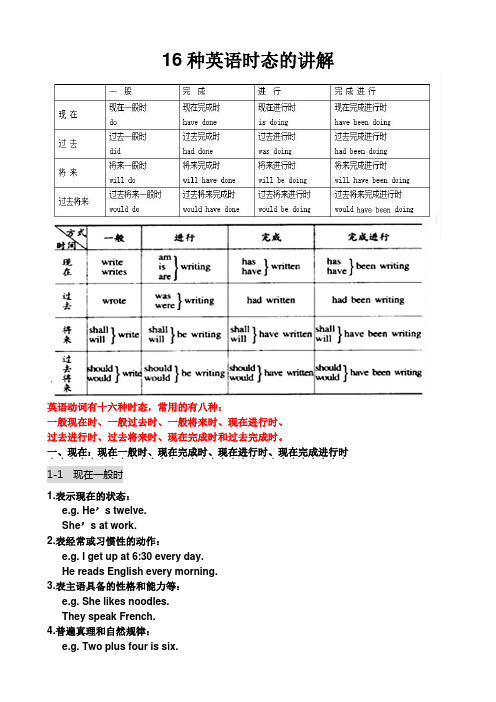
16种英语时态的讲解英语动词有十六种时态,常用的有八种:一般现在时、一般过去时、一般将来时、现在进行时、过去进行时、过去将来时、现在完成时和过去完成时。
一、现在:现在一般时、现在完成时、现在进行时、现在完成进行时..............................1-1 现在一般时1.表示现在的状态:e.g. He’s twelve.She’s at work.2.表经常或习惯性的动作:e.g. I get up at 6:30 every day.He reads English every morning.3.表主语具备的性格和能力等:e.g. She likes noodles.They speak French.4.普遍真理和自然规律:e.g. Two plus four is six.The moon goes around the earth.一般动词:主语是第一人称单复数时,没有变化;主语是第三人称时,动词+s,以sh /ch/ s/x /z/ o 加es,以y结尾的,前面是元音字母的直接加es,前面是辅音字母的,把y改i加es。
1-2 现在完成时现在完成时构成: have/has + 动词的过去分词1.定义:现在完成时表示到目前为止已经完成,并对现在留下某种后果和影响的动作。
1.表示过去发生的某一动作对现在造成的影响或结果,常与一些时间状语2.表示过去发生的动作或存在的状态,一直持续到现在,也许还将继续下去,可以和表示从过去某一时刻延续到现在的一段时间的状语连用如:already已经,早以, yet仍然,还, ever曾经, never从不;决不,从未,从来没有, just 刚刚,仅仅, before在···之前, once一次,曾经,twice两次,两倍,等连用,也可以和包括现在在内的时间状语,如these days,today,this year,so far(目前,到目前为止)等连用.即for +时间段,since(自从)+时间点/从句, in the last ten years等,谓语只可用延续性动词.2. has/have been to 去过某地表示某人的一种经历,可与once,twice,already,ever,never,等连用。
初中英语时态8种基本时态结构

初中英语时态8种基本时态结构八种基本时态时间是人类的共同认知,学习语言的过程也不可避免的牵涉到时态的描述。
在初中英语中,我们主要掌握八种基本时态结构,即一般现在时、一般过去时、现在进行时、过去进行时、现在完成时、过去完成时、将来时、过去将来时。
一般现在时表示经常性或习惯性动作,常用于描述客观现存的事实,表达真理、命题、法则和科学知识。
this is He usually goes to school by bike.一般过去时用来叙述过去发生的事,常与一般过去时助动词did一起使用,表示已完成的动作。
例如:I did my homework yesterday.现在进行时描述正在进行的动作,可以用来表示临时的正在发生的动作和经常性的正在发生的动作,在其句子中要用现在进行时的动词,以及一般助动词am、is、are等。
例如:She is watching TV.过去进行时也描写进行的动作,但指发生在过去的动作,句中要用过去进行时的动词,助动词时was或were.例如:I was doing my homework when she came.现在完成时表达过去发生的动作,它的过去的动作可能发生在现在仍有影响的现象之前,句子中用现在完成时的动词,与have/has 和过去分词一起形成结构。
例如:I have finished my homework already.过去完成时是表达某个动作在更远的过去发生,在句子中要用过去完成时动词,用had连接had 和过去分词构成。
例如:He had finished his homework before dinner.将来时指将要发生的事情或正在进行的事情,句子中用将来时的动词,两个助动词will和shall。
例如:He will do his homework in the evening.过去将来时描写在过去的一定时刻,某个将来时间的某个动作,句子中用一般将来时的动词,两个助动词would和should来构成结构。
初中英语的八大时态结构

初中英语的八大时态结构英语中八种基本时态有:一般现在时、一般过去时、现在进行时、过去进行时、现在完成时、过去完成时、—般将来时、过去将来时。
一、一般现在时基本结构:1)动词+原形(如主语为第三人称单数,谓语动词上要加s,es,或变y为i,再加es)2)如果含有be动词:主语+is/am/are+形容词/名词/介词短语等(主语为第三人称单数用is,主语为I用am,主语为复数用are)例句:Our teachers always arrive early.I am an English teacher.二、一般过去时基本结构:1)主语+动词过去式2)如果含有be动词:主语+was/were+形容词/名词/介词短语等(主语为单数用was,主语为复数用are)例句:She sang a song in class yesterday.They were here just now.三、现在进行时基本结构:am/is/are+doing(主语为I用am,主语为第三人称单数用is,主语为复数用are)例句:It's getting colder and colder.They are doing well in their lessons.四、过去进行时基本结构:was/were + doing例句:She was working at nine o'clock yesterday?When I arrived, they were reading a story.五、现在完成时基本结构:has/have + done(过去分词)(主语为单数用has,主语为复数用have)例句:It has rained recently.They have lived here for more than twenty years.六、过去完成时基本结构:had + done(过去分词)例句:By the end of last week,they had reviewed four books.He had bought the car before 2003.七、一般将来时基本结构:1)is/am/are + going to + do(主语为第三人称单数用is,主语为I用am,主语为复数用are)2) shall/will + do(主语为第一人称可用shall/will,其他人称用will)例句:We are going to visit the factory tomorrow.I think she will be back next week.八、过去将来时基本结构:1)was/were + going to + do(主语为单数用was,主语为复数用were)2)would + do例句:They told me they would go to Beijing.The doctor asked who was going there.。
新概念英语第一册语法知识点
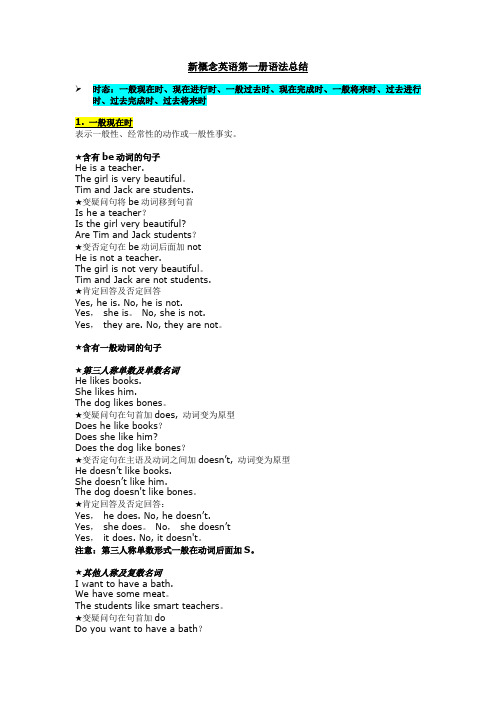
新概念英语第一册语法总结➢时态:一般现在时、现在进行时、一般过去时、现在完成时、一般将来时、过去进行时、过去完成时、过去将来时★含有be动词的句子He is a teacher.The girl is very beautiful。
Tim and Jack are students.★变疑问句将be动词移到句首Is he a teacher?Is the girl very beautiful?Are Tim and Jack students?★变否定句在be动词后面加notHe is not a teacher.The girl is not very beautiful。
Tim and Jack are not students.★肯定回答及否定回答Yes, he is. No, he is not.Yes,she is。
No, she is not.Yes,they are. No, they are not。
★含有一般动词的句子★第三人称单数及单数名词He likes books.She likes him.The dog likes bones。
★变疑问句在句首加does, 动词变为原型Does he like books?Does she like him?Does the dog like bones?★变否定句在主语及动词之间加doesn’t, 动词变为原型He doesn’t like books.She doesn’t like him.The dog doesn't like bones。
★肯定回答及否定回答:Yes,he does. No, he doesn’t.Yes,she does。
No,she doesn’tYes,it does. No, it doesn't。
注意:第三人称单数形式一般在动词后面加S。
★其他人称及复数名词I want to have a bath.We have some meat。
英语的几种时态
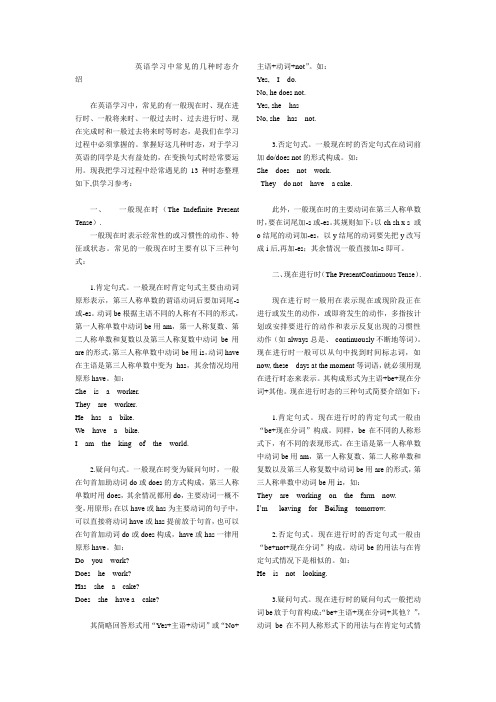
英语学习中常见的几种时态介绍在英语学习中,常见的有一般现在时、现在进行时、一般将来时、一般过去时、过去进行时、现在完成时和一般过去将来时等时态,是我们在学习过程中必须掌握的。
掌握好这几种时态,对于学习英语的同学是大有益处的,在变换句式时经常要运用。
现我把学习过程中经常遇见的13种时态整理如下,供学习参考:一、一般现在时(The Indefinite Present Tense).一般现在时表示经常性的或习惯性的动作、特征或状态。
常见的一般现在时主要有以下三种句式:1.肯定句式。
一般现在时肯定句式主要由动词原形表示,第三人称单数的谓语动词后要加词尾-s 或-es。
动词be根据主语不同的人称有不同的形式,第一人称单数中动词be用am,第一人称复数、第二人称单数和复数以及第三人称复数中动词be用are的形式,第三人称单数中动词be用is,动词have 在主语是第三人称单数中变为has,其余情况均用原形have。
如:She is a worker.They are worker.He has a bike.We have a bike.I am the king of the world.2.疑问句式。
一般现在时变为疑问句时,一般在句首加助动词do或does的方式构成,第三人称单数时用does,其余情况都用do,主要动词一概不变,用原形;在以have或has为主要动词的句子中,可以直接将动词have或has提前放于句首,也可以在句首加动词do或does构成,have或has一律用原形have。
如:Do you work?Does he work?Has she a cake?Does she have a cake?其简略回答形式用“Yes+主语+动词”或“No+主语+动词+not”。
如:Yes, I do.No, he does not.Yes, she hasNo, she has not.3.否定句式。
句子时态

一般现在时、一般过去时、一般将来时、现在进行时、过去进行时、现在完成时、过去完成时,过去将来时,现在完成进行时。
常用的时态只有八种。
1.一般现在时的用法1)表示经常性、习惯性的动作;表示现在的状态、特征和真理.句中常用often,usually,every day等时间状语。
例如:He goes to school every day.(经常性动作) He is very happy.(现在的状态)The earth moves around the sun.(真理)2)在时间状语从句和条件状语从句中,用一般现在时表示将来.例如:If you come this afternoon,we' ll have a meeting.When I graduate,I’ll go to the countr yside.3)有时这个时态表示按计划、规定要发生的动作,(句中都带有时间状语)但限于少数动词如begin,come,leave,go,arrive,start,stop,return,open,close等.例如:The meeting begins at seven. The train starts at nine in the morning.4)表示状态和感觉的动词,如be,like,hate,think,remember,find,sound等常用一般现在时.例如:I like English very much. The story sounds very interesting.5)书报的标题,小说等情节介绍常用一般现在时.2.一般过去时的用法l)表示过去某时间发生的事、存在的状态或过去反复发生的动作.He saw Mr Wang yesterday. He worked in a factory in 19862)表示过去经常发生的动作,也可用―used to‖和―would +动词原形‖。
- 1、下载文档前请自行甄别文档内容的完整性,平台不提供额外的编辑、内容补充、找答案等附加服务。
- 2、"仅部分预览"的文档,不可在线预览部分如存在完整性等问题,可反馈申请退款(可完整预览的文档不适用该条件!)。
- 3、如文档侵犯您的权益,请联系客服反馈,我们会尽快为您处理(人工客服工作时间:9:00-18:30)。
时态专项复习(一般现在时、现在进行时、一般过去时)一、用动词的正确形式填空1. I ________ (do) my homework every evening.2. We _______ (fly) kites in the park on Sundays.3. My mother _____________ (clean) our room on Sundays.4. Tom ____________(play) the piano every Saturday. Now he____________ (play).5. She ___________(like) swimming. She _____________ (swim) last weekend.uallymymother_______________(wash)thedishesafterlunch.Butmygrandm a_____________ (wash) today.7. Look at the man! He ____________ (read) a magazine.8. Look! The plane ______________ (fly) over the building.9.Listen!Myaunt______________(sing)intheroom.Sheisasinger.She__________(l ike)singing. She _____________(have) a music show. She is excited.10. Tom and Mike always ______________ (swim) in the river. They___________ (swim) in theswimming pool three days ago. Look! They________________ (swim).11. What ____ you usually ______ (do) in the evening? I ______ (play) computer games.12. What _______ you _______ (do) now? I __________ (make) a paper plane.13. What _______ he _______ (do) now? He _____________ (dance).14. What _______ she ______ (do) yesterday? She ______ (visit) her grandparents.15. ______ your mother ______ (read) newspaper in the morning? Yes, She________ .16. _______ you _______ (like) fishing? No, I ______ . I like __________ (swim), but my brother___________ (like).17. How ______ your father _______ (go) to work every day? He _________ (go) by bike. Butit’scoldtoday.He___________(take)theNo.21bus,,andhe____________(go)toworkbyt axiyesterday.18. _______ the monkey _______ (like) climbing trees? Yes, it _______ .19. What _______ your father ______ (do) after lunch? He _______ (read) a comic book.What_____he_______(do)today?He_______(clean)thekitchenformygrandma.Look!H e(clean).20.________you______(collect)stamps?Yes.I_______ .________yourbrother___ ___(collect), too? No, he ________ .二、选择题1. _____ he _____ to the park at 6:30 in the morning? No,he _____ .A. Does; goes; doesB. Does; go; doesn’tC. Does; go; does2. What colour _____ you _____ this bookcase? I _____ it pink.A.are; going to paint; am going to paintB. do; paint; paintC. did; paint; painted3. Tim always _____ a picture at home. He _____ a car now.A. draws; is drawingB. draw; drawC. draws; draw4. She usually _____ her friends. They often _____ tea.1A. see; drinkB. sees; drinksC. sees; drink5. He usually _____ the dishes at night, but tonight he _____ clothes.A. wash; washB.washes; is going to washC. is washing; washes6.Mr.Greenusually_____hisnewspaperintheevening,butheandhiswife_____telev isionyesterday evening.A.reads; watchesB.reads; is going to watchC.reads; watched7. Where are the man and the woman? They _____ near the tree.A. sitB. satC. are sitting8. _____ your penpal _____ diving? No, he _____ .He ______ writing stories.A.Does; like; doesn’t; likesB.Does; likes; doesn’t; likeC.Do;like; don’t; likes9. _____ you _____ fishing yesterday? No, we _____ .A. Does; go; doesn’tB. Did; go; didn’tC. Do; go; don’t10. Open the window, Please. Look! He _____ it.A. opensB. is openningC. is opening11. I usually _____ some milk every day. But I _____ coffee yesterday.A. drink; drankB. is drinking; drinkC. drank; am drinking12. Mr. Green often __ his newspapers at night. But he ___ an interesting book tonight.A. reads; readsB. reads; readC. reads; is going to read13. The old man _____ playing sports in the park. He _____ morning exercise now.A. likes; is doingB. likes; doesC. like; doing14. What _____ you usually _____ in the evening? I ______ computer games.What _____ you _____ last night? I _____ a book.A. do; do; play; did; do; readB. did; do; played; do; do; readC. does; do; plays; do; do; am reading15. Where ______ the boy _____ ? He _____ across the river now.A. does; swim; swimsB. is; swimming; is swimmingD. is; swimming; is swimming16. _____ you _____ to music now? Yes, we _____ .A. Do; listen; doB. Did; listen; didC. Are; listening; are17. Put on you coat, please. OK. I ___ it on.A. am puttingB. am going to putC. put18. _____ you ______ coffee? Yes, I ______ .A. Do; like; doB. Did; like; didC. Are; like; am19. Look! Two cats ______ across the wall.A. runB. runsC. are running20. She ____ tea, but he ___ .A. l ikes; doesn’tB; like; don’tC. like; doesn’t21. ---How many ________ in the tree?---There are two.A. bird are therB. birds is therC. birds are thereD.birds are their22.. Mr Johnson usually goes to the hospital ________.A. by his carB. by the black carC. by carD. by the new car23. Does your brother play ping-pong __________?A. on every afternoonB. every afternoonC. in every afternoonD. at every afternoon224. ________ do you usually come to school? A. How B. What C. Which D. How much25. ---Don’t you usually come to school by bike? ---_________. But I sometimes walk.A. Yes, I doB. No, I don’tC. Yes, I doD. No, I don’t26. What ____ Tom and his mother like ?A. doesB. doC. isD. are27. What’s your hobby? My hobby is ______ model plane.A. makingB. makeC. makingD. made28. ---Did you go to the park on Sunday morning?---___, I went there in the afternoon.A. YesB. NoC. SureD. Sorry29. I don’t think he’s so great, but my mom _________. A. do B. does C. is D.are30. A kid ______ breakfast every morning, because it’s good for his health.A. have toB. has toC. has to haveD. has to has现在完成时态练习题1.All the furniture in the building _______ to the company not to his own.A. is belonged B belongs C. belong D are belonged2. When I was at college I _______ three foreign languages, but I _______ all except a few words of each.A. spoke, had forgotten B spoke, have forgotten C had spoken, had forgotten D had spoken, have forgotten3. -----We would have walked to the station. It was so near.----- Yes, a taxi _______ at all necessary.Awasn’tBhadn’tbeen Cwouldn’tbe Dwon’tbe4. Idon’treally work here. I _______ until the new secretary arrives.A just help outB have just helped outC am just helping outD will just help out5. He _______ his leg when he _______ in a football match.A broke, playedB was breaking, was playingC broke, was playingD was breaking, played6. The new secretary is supposed to report to the manager as soon as she_______.A will arriveB arrivesC is going to arriveD is arriving7. As she _______ newspaper, Granny _______ asleep.A read, was fallingB was reading, fellC was reading , was fallingD read, fall8. ---Do you like the material?---Yes, it _______ very soft.A is feelingB feltC feelsD is felt9. ---Come on in, Tom. I want to show you something.--- Oh, how nice of you! I _______ you _______ to bring me a gift.A never think, are goingB never thought, were going Cdidn’tthink , were goingDhadn’tthought , were going10. ----You’veagreed to go, so whyaren’tyou getting ready?----But I _______ that you _______ us to start at once.Adon’trealize, want Bdon’trealize, wanted Chaven’trealized, wantDdidn’trealize, wanted311. The house is dirty. We _______it for weeks.Adidn’tclean Bhadn’tcleaned Cdon’tclean Dhaven’tcleaned12. -----_______ the sports meet might be put off.---- Yes, it all depends on the weather.AI’vebeen told BI’vetold CI’mtold D I told13. ----I’msorry to keep you waiting.----Oh, not at all. I _______ here only a few minutes.A have beenB had beenC wasD will be14. Youdon’tneed to describe her. I _______ her several times.A. had met B have met C met D meet15. The cost of living _______ by ten percent before the government took any action.A was goingB went upC had gone upD has gone up16. By the time new pupil _______ enough courage to raise his hand , the bell for the end of the lesson _______.A had gathered ; was already ringingB was gathering ; had already rungC gathered ; already rangD would gather ; would already have rung17. -----Did you go to Beijing for vacation ?-----I _______ to go , but I got sick at the last minute.A was planningB have plannedC had been planningD have been planning18. ------When will they leave ?------They _______ very soon .A do leaveB are leavingC have leftD leave19. ------Was he studying for an exam ?------Yes , he's _______ it next week.A doingB to takeC makingD to give20. ------Are there going to be many people at your party today ?------We hope that _______.A there will beB there are goingC there areD there going to be21. She must have arrived there last night , _______ she ?A didn'tB haven'tC needn'tD mustn't22. _______ the letter , I ran out of the room to the post office.A Since I have finished writingB No sooner than I had finished writingC As soon as I finished writingD After I have finished23. Twelve inches _______ one foot.A will makeB is makingC makesD make24. I _______ going to London next month.A have thought ofB shall think ofC am thinking ofD will think of25. He _______ English for six years by the time he takes his examination.4A has studied B studied C will have been studying D had been studying26. By this time next year he _______ from this college.A is graduatingB will have graduatedC should be graduationD will be graduation27. _______ the school when the bell rang.A I hardly had reachedB Hardly had I reachedC I hardly reachedD Hardly did I reach28. He promised us that he _______ early but he _______yet.A would be; hasn't arrivedB is ; hasn't been arrivingC should be ; isn't arrivingD will be ; hadn't arrived29. The teacher told the pupils that the earth _______ round.A isB wouldC wasD were30. The moment they met , they knew that _______ .A they would have friendlinessB they would be friendsC friendship they would haveD friendship would happen31. We _______ the problem for quite some time , but we _______ any conclusion yet.A had discussed ; haven't reachedB discussed ; haven't reachedC have discussed ; haven't been reachingD have been discussing ,haven't reached32. It wasn't until two o'clock that I _______ to sleep.A would goB wentC was goingD had gone33. ------Where _______ my book ? I can't see it anywhere.------ I _______ it on this table . But now it's gone .A were you putting ; have putB had you put ; was puttingC have you put ; putD did you put ; have put34. Perhaps it will be a long time _______ from abroad.A that Tom comes backB before Tom comes backC when Tom will come backD when Tom comes back35. If the film _______ is our school , we'll go and see it .A is to be shownB was shownC is shownD will be shown36. -----How _______ on with your English these days .-----Not bad.A have you been gettingB are you gettingC did you getD have you got37. -----What _______ when I phoned you this morning?------I _______ my homework and was starting to take a boat.A are you doing , have just finishedB were you doing , had just finishedC had you done , just finishedD did you do , just finished38. I _______ such an interesting book before.A was never readingB will never readC had never readD have never read39. _______ that the earth was the centre of the universe.A People were believingB It was once believed5C People were once believed D People were said40. Two of the boys _______ while playing football.A had been hurtB got hurtC were hurtingD hurt41. Prices _______ sharply in the past few years.A have raisedB have been raisedC have been risenD have risen42. The number of the students in our school _______ 1200.A is added up toB has been added up toC adds up toD have added up to43. What he said at the meeting _______ true .A was provedB provedC is provedD proves44. How long do you think the meeting ______A is lastingB is lastedC will lastD lasts45. The May 4th movement ______ in 1919.A had taken placeB was taking placeC was taken placeD took place46. These kinds of shoes ______ well.A were not soldB won't be soldC are not soldD don't sell47. On returning home , I found I ______ umbrella in the office.A had leftB have leftC leftD would leave48. Once you ______ a promise , you must carry it out.A have madeB had madeC madeD is making49. She ______ Charles for a year.A has been married toB has got married toC married withD married50. The singer lived in California until he ______ to university.A had sentB was sendingC had been sentD was sentKEY (答案):1------10: B B A C C ; B B C B D11----20: D A A B C ; A D C B B21----30: A C C C C ; B B A A B31----40: D B C B C ; B B D B B41----50: C D B C D ; D A A A D1.单项选择1.He asked me _____ during the summer holidays.A. where I had beenB. where I had goneC. where had I beenD. where had I gone2. What ____ Jane ____ by the time he was sever?A. did, doB. has,doneC did, did.D. had,done3. I ______ 900 English words by the time I was ten。
